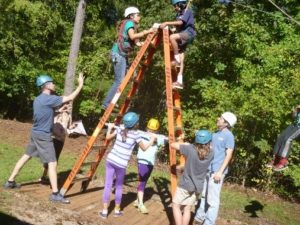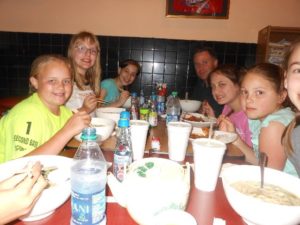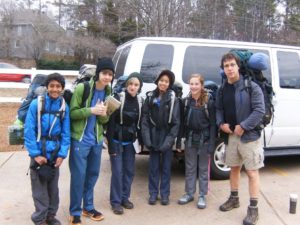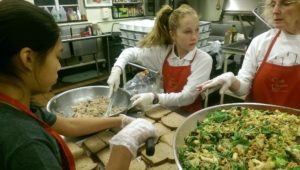Independence begins early in Montessori education. It begins with saying goodbye to mom or dad as a toddler and using the toilet. Letting go is never easy for parents, even when they know becoming independent is part of the growth of a child. As the child grows and develops into an independent person he is eager to live in his new found independence.
No child who is independent in the bathroom would like to go back to sitting in wet or dirty pants. In the same way a child who dresses on her own, comes to school, chooses work appropriately, handles all of the day’s problems and celebrates her accomplishments wants be given the freedom that comes along with the responsibility that she has shown she can handle. At school more freedom is given as the child is ready and eager to take on more responsibility.
In the Primary classes the child gains freedom to work outside. It may be taking care of the garden, sweeping, etc. More freedom is given as the child has more and more lessons widening the realm of choices in the class. Children in the Primary classes do not leave the school for trips.
As the child enters Elementary they begin to go take part in what is called “going out”. A small group of children may need to go to the library or a museum for something they are researching, or to the pet store for classroom pet supplies. They make the arrangements, ask an adult for a ride, and get what they need. Another way we increase independence is in class trips.
In the third year of the Elementary program the child is showing signs of readiness to become even more independent of her parents. In the first and second year class trips involve only a short time, or day trips. By the third year an overnight class trip is included in the Village Montessori curriculum. This is not only a great educational adventure it is also a way for the child to live out her own independence. She packs her belongings in a bag, and says goodbye for a little longer than 24 hours. What a great affirmation of her growth! This is not just sleeping over at a friend’s house, it is being part the community in a new setting.

Packed and ready for the class trip!This bigger trip gives the child a sense of pride and accomplishment. For some it is the first time away from home. The confidence boost is amazing.

In the fourth and fifth years the class trip will be for three nights. It is done early in the year and incorporates team building activities for the group. Previous independence building has readied the child for this experience.Team building activitiesThe capstone trip of the Elementary level is the end of the year sixth year trip. This trip is for a week. History lessons make up the academic part of the trip, but this trip’s biggest advantage is increasing the independence of the child. This may be the first time a child has been away from home for an extended period. The children must plan their days, calculate finances, map out routes, and prepare meals after shopping for food. The children plan and prepare all aspects of this trip. Many life lessons are learned.Planning and preparingWhen the child reaches Middle School two trips are part of the Village Montessori curriculum. The Adolescent Program trip schedule is at least two trips per year. At the beginning of the year a week-long trip is made where the group bonds and depends on one another for many important things. Most recently the group spent a week in a cabin at a state park. Here they planned all activities and meals. They spent time hiking, rafting, going to waterfalls, and generally having a good time together. The second trip of the year will be a city trip. This year it is Washington D.C. On alternate years the second trip will be a hiking/camping trip.Group bondingThe Adolescent Program makes good use of the school van. They travel to physical education locations which have included: rock climbing, archery, yoga and more. The van is also used for traveling to locations for social service projects like helping to feed the hungry at a soup kitchen, or working to sort food for a food pantry.Helping to feed the hungryThe common thread throughout the years is the independence of the child. Parents are asked not to contact the children on these trips. No cell phones are allowed. Children are supported if feeling homesick, and not generally allowed to phone parents. Missing home is not usually a problem, even for the most reluctant child, because of the fun and company of classmates. All of the trips are well planned and the children are busy all day and tired out at night. It is much harder for the parents to let go. And let go we must for our children to meet their intellectual and emotional needs for growing up a well-adjusted and educated citizen of the world. Travel and new experiences are immensely expanding for everyone. It is our vision for the future to offer an international service trip in Middle School.

Parents can enhance their child’s traveling experiences by doing things locally as well. Taking MARTA to the aquarium or somewhere downtown is enlightening. Being in a city is a different experience than being at home here in the suburbs. Traveling by some method other than a car will be a fun experience for any child. Atlanta has a host of interesting things for children and parents alike. A great resource is www.atlantaplanit.org

I hope you and your children will enjoy many hours of mind expanding experiences in traveling near and far.
